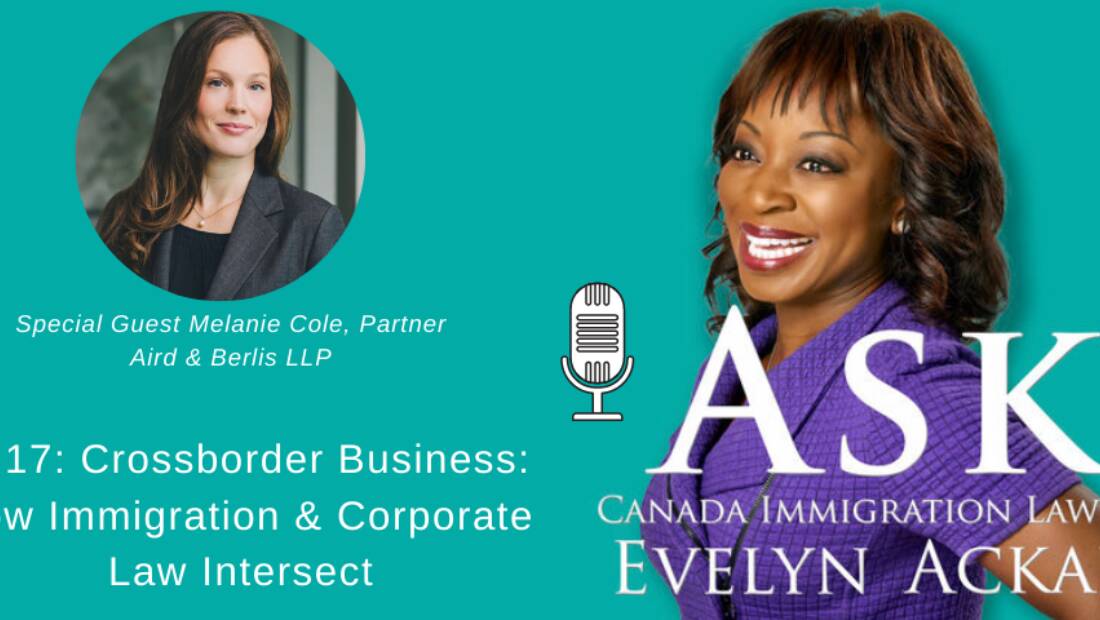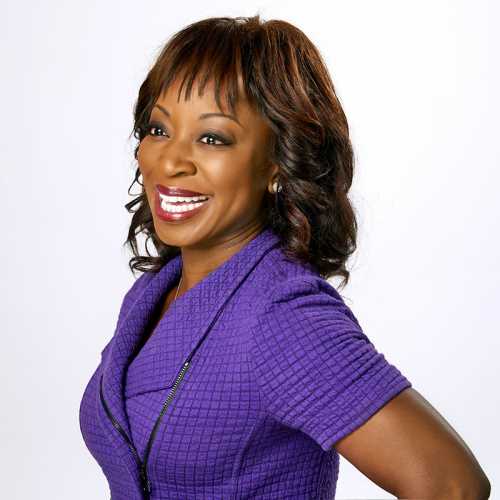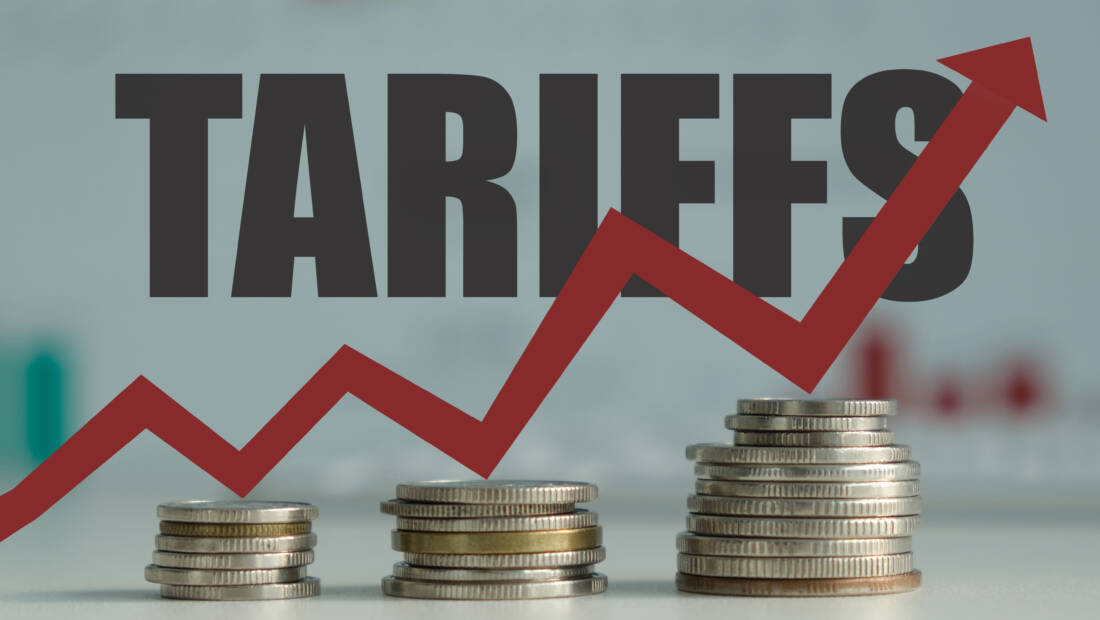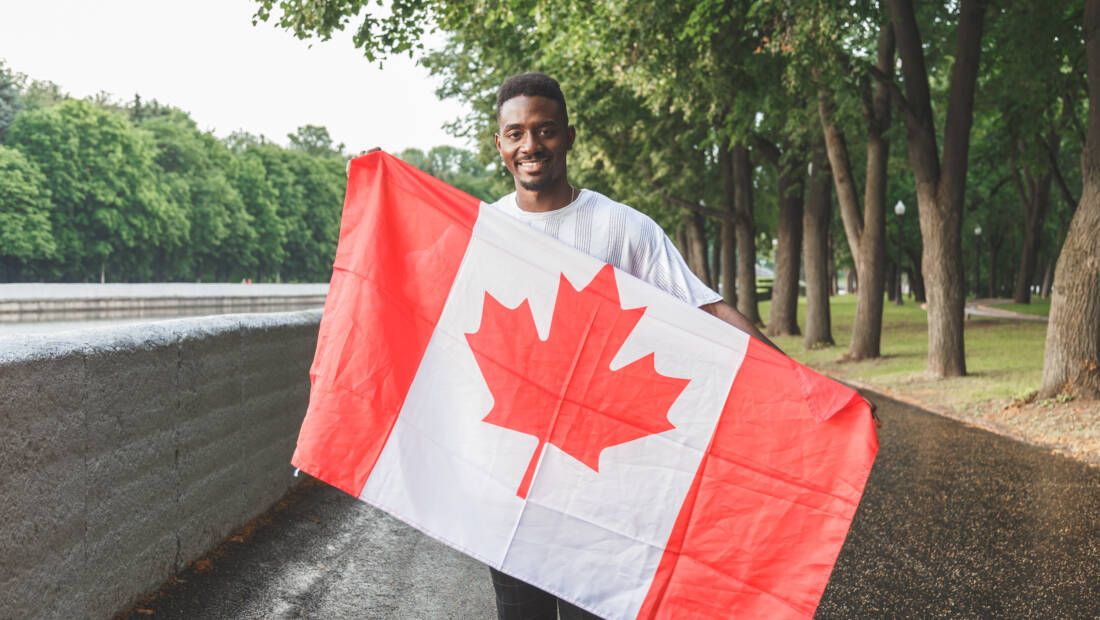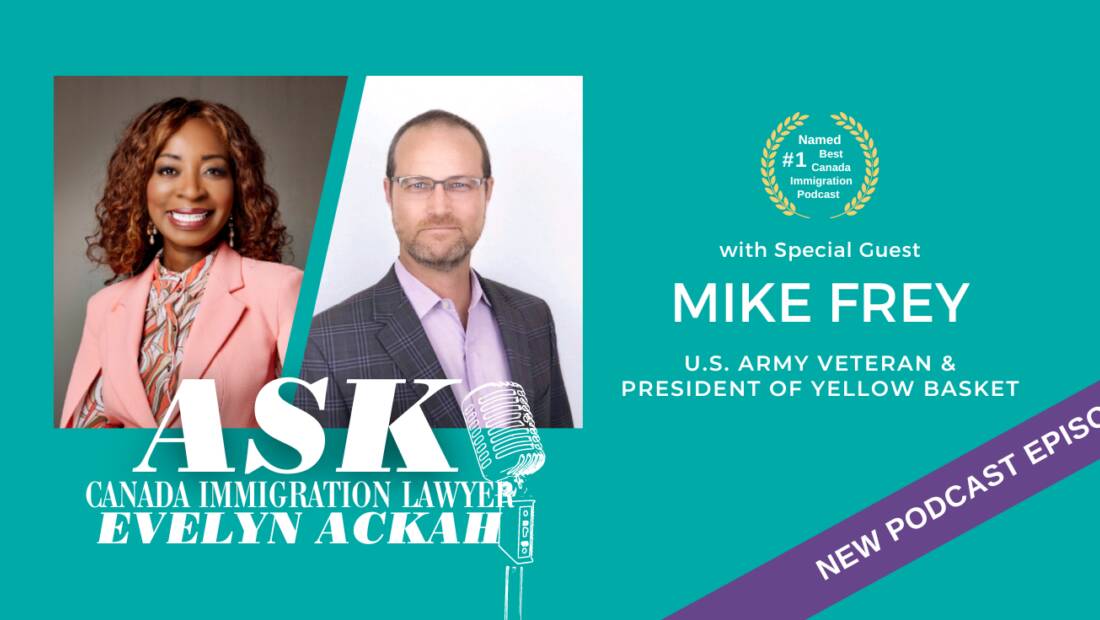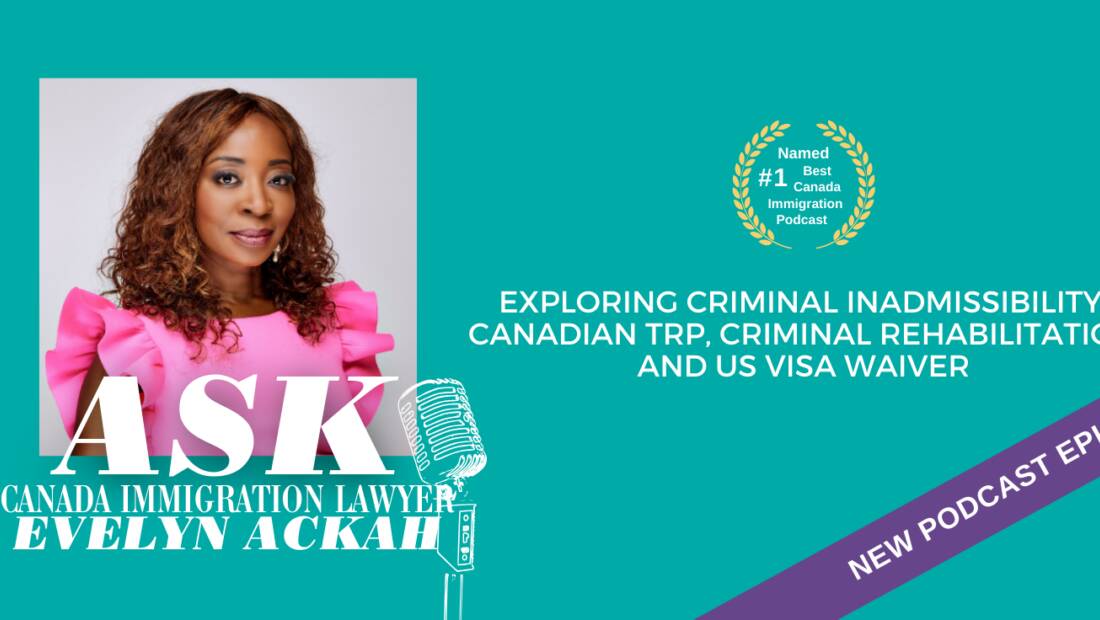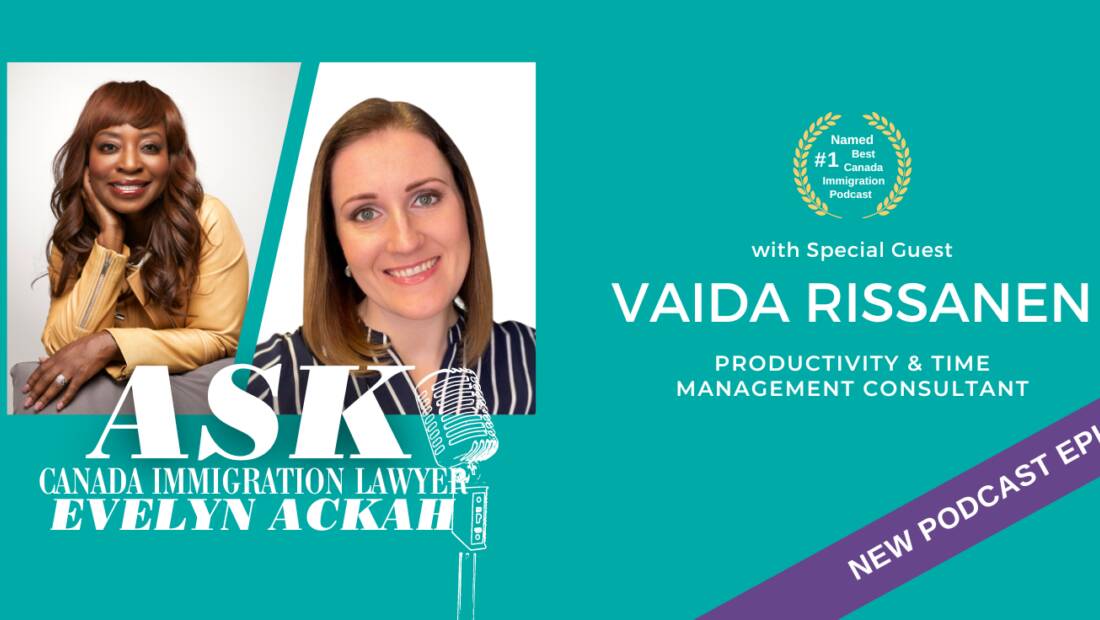Or listen on your favourite podcast app
This week I have the privilege and honor of speaking with Melanie Cole, Partner at Aird & Berlis LLP law firm in Toronto about crossborder business transactions, her services as a cross-border corporate lawyer and how immigration and corporate law intersect.
Canada Immigration Lawyer Evelyn Ackah and Toronto Lawyer Melanie Cole discuss
- cross-border business and immigration law
- legalization of cannabis in Canada and immigrant entrepreneurship
- startup visas and business immigration
- women in law
- our businesses and our law practices
- how we can work with you to do cross-border transactions and get you to Canada by way of immigration.
Transcription
Evelyn Ackah:
Okay, good day, everyone. This is Evelyn Ackah from Ackah Business Immigration Law, and our Ask Canada Immigration Lawyer podcast. And I'm really excited today because I have the pleasure of speaking with Melanie Cole from Aird & Berlis law firm in Toronto, Ontario, Canada. And she is a partner at Aird & Berlis focusing on cross border business and capital markets and cross border transactions. And welcome so much, Melanie, thanks for making time for this.
Melanie Cole from Aird & Berlis LLP:
Oh, thank you so much, Evelyn. It's my pleasure and I'm excited to chat with you today. Hi everybody.
Evelyn Ackah:
So tell me about you. Tell me about your practice a little bit, talk about how long have you been doing what you've been doing and a little bit about your career progression, and then we'll get into the cross border stuff.
Melanie Cole from Aird & Berlis LLP:
Absolutely. So I started out after my undergrad degree in Ottawa, and I was working for a cabinet minister, and I got interested in law because I was working on self-governance legislation for First Nations, and was working with a lot of people from the justice department. And I said, this is really an interesting tool to use, lawyers have different tools to approach problems, and I decided to go to law school. My chief of staff at the time encouraged it.
Melanie Cole from Aird & Berlis LLP:
I ended up, after articling, I articled during the Lehman Brothers crash, the last economic recession. So it was an interesting time for someone who was thinking about corporate law, and it was a challenging time, which is not at all as challenging as the economic and social issues we're facing right now, but it was certainly challenging. Anyway, I got into corporate law, and more on the capital market side.
Melanie Cole from Aird & Berlis LLP:
So what I do on a day to day basis is that I help both public and private companies with their growth trajectory. I helped them establish themselves both domestically and internationally, help them with their day to day corporate and commercial agreements, help them in terms of their growth, in terms of financings, that's a lot of what I do, is to help source and ensure that the laws and regulations are followed when people are raising money.
Evelyn Ackah:
Great.
Melanie Cole from Aird & Berlis LLP:
And that they're doing that with... so I do a lot of that, our firm is about 150 or 60 lawyers now, we sort of cover the gamut of things on the corporate side. So pretty interesting career, and I do enjoy it. I like working with the clients and getting to know them.
Evelyn Ackah:
That's fabulous. I remember my years back in the day when I worked in Toronto on Bay Street and Aird & Berlis has always had a wonderful reputation and they've always been a local firm that did great work. So it's really that they're growing and growing the way they are.
Evelyn Ackah:
So let's start chatting about your work. So basically, the reason that we were connected by a mutual friend is because I do cross border immigration, and we thought that there'd be some nice synergies around that with the transactional work you do cross border. So at Ackah Law we work with foreign companies and individuals who need legal assistance to get immigration so they can open branch offices, subsidiaries, head offices, whatever it is, based on how they want to structure. And we really want to help people cross borders seamlessly, and we don't do corporate work. So for us, it's always sending it out elsewhere, referring it to professionals like yourself.
Evelyn Ackah:
So tell me about Aird & Berlis focused on doing business in Canada, and that cross border piece. Where did that mandate come from, or how long have you guys been focused on that, and that mid market kind of focus?
Melanie Cole from Aird & Berlis LLP:
Yeah, so it's always been sort of the bread and butter of Aird & Berlis from the beginning. We've had, over the years, many opportunities to merge both across the country and internationally with other firms, and they've really decided to focus, instead of being pizza and pasta, they're focusing on one segment of the market. That being said, we work startups that we work with huge billion dollar public companies, and everything in between. But I would say that the majority of our clients are in the growth phase of their business.
Melanie Cole from Aird & Berlis LLP:
So when you have companies at that level, you're needing to collaborate, especially when the clients are located elsewhere, with specialists across Canada and also internationally. And so we do a lot of business back and forth with the US, and I would say that one of the main drivers, because when people are coming to Canada, one of the main drivers, and what's making their decision about how they're going to come over, what kind of office they're going to open, which I know is something that you help them figure out as well, it's driven by tax.
Evelyn Ackah:
Yes.
Melanie Cole from Aird & Berlis LLP:
And it's driven by the tax system, both personal income tax and also corporate tax.
Evelyn Ackah:
Mm-hmm (affirmative).
Melanie Cole from Aird & Berlis LLP:
So that's a very strong area of our firm, and we have specialists who work very hard internationally to develop those connections. And that's always been a very helpful thing for us because often the work we're getting is from other professionals, and to develop those relationships had always been very important to Aird & Berlis, and also just to have the chops when the work comes in, to be able to help our clients reach the next level.
Evelyn Ackah:
Perfect. So how do you think Canada's laws and programs have changed to become more welcoming to foreigners who want to launch businesses in Canada?
Melanie Cole from Aird & Berlis LLP:
Yeah, I think, you know, on the immigration front is certainly your bread and butter, speaking of bread and butter. And we've seen some interesting opportunities, I think, for Canada, given some of the recent pronouncements, especially in the United States, with what's going on there and some of the limitations. So people are looking to Canada, which I think is a huge opportunity, to welcome people who are wanting to start businesses. And the government's come up with some really interesting programs on the immigration side, just to have people come here.
Melanie Cole from Aird & Berlis LLP:
So the GTS program is one of those programs that is helping people come over, skilled workers.
Evelyn Ackah:
Global Talent Stream, I'm going to break it down for people.
Melanie Cole from Aird & Berlis LLP:
Yeah, sorry.
Evelyn Ackah:
Who are not as experienced as you and I are.
Melanie Cole from Aird & Berlis LLP:
Yeah, so the Global Talent Stream, that's one of the important things that the government has done, but there are other things that I think are attractive. And I mean, you can speak more to the immigration side, but I would say once people are here, people need funds to grow their businesses. And we're seeing companies like Telus and RBC, and they're investing in startup stage businesses, and they're actually providing funding and accelerators for those kind of companies.
Evelyn Ackah:
Mm-hmm (affirmative).
Melanie Cole from Aird & Berlis LLP:
And you're also seeing, in terms of capital raising in Canada, venture capital has gone up about 500% in Canada since about 2014, which is unbelievable. So we're seeing people who are investing in the growth of companies, which I think is attractive to people.
Evelyn Ackah:
Yeah, I think you're right.
Melanie Cole from Aird & Berlis LLP:
Who are coming here and wanting to grow a business.
Evelyn Ackah:
I think it's great. I mean, like for us, we get the benefit of people. What I'm seeing on the immigration side is people from Silicon Valley or from other parts of the United States, from Asia, who were looking at Canada now and thinking, hey, this might be a great place to create a branch or a center of intelligence or excellence, because of other immigration issues on the US side.
Evelyn Ackah:
And so it's a great opportunity to kind of, we call it nearshoring, where they will bring their skilled people to Canada, set up a business, they need all the tax, they need all the corporate, they need all the employment, they need to have an IP, all the things that you provide to help them to launch successfully and keep their people here. Right?
Melanie Cole from Aird & Berlis LLP:
Absolutely
Evelyn Ackah:
I mean, they don't want to lose skilled workers. Are you seeing that in your practice too?
Melanie Cole from Aird & Berlis LLP:
Yeah, I mean, on the tech side. If you think about Waterloo, for example, an amazing program that they have at Waterloo, we see a lot of what's called brain drain from Waterloo where a lot of these people are getting scooped up and going to Silicon Valley and other tech hubs. So yeah, you definitely see that happening.
Evelyn Ackah:
Oh, that's great. So tell me about tech immigration. How connected are you to that, and what trends are you seeing in the international tech clients that are coming here? I mean, I always see them at the end when they've already basically decided, they've already spoken to somebody like you, they've engaged a corporate lawyer, they usually know already what they want and if not, then I refer them. But what are you seeing in terms of that? Is it the H1B kind of issues in the States that's driving this? Or is there something else, maybe our tax structure? I don't know. I mean, just thinking off the top of my head.
Melanie Cole from Aird & Berlis LLP:
Yeah. I mean, you've raised something that's important, and again, I think a lot of these decisions, at least on the business level, are driven by tax.
Evelyn Ackah:
Mm-hmm (affirmative).
Melanie Cole from Aird & Berlis LLP:
And we also have quite affordable rent and other issues. I mean, if you look at Manhattan versus downtown Toronto, even though downtown Toronto is very expensive.
Evelyn Ackah:
Yeah.
Melanie Cole from Aird & Berlis LLP:
I would say it's a less... yeah, exactly. So there's a lot of attractive things about Canada. And also we have a very stable bank system, which is really, really important. I mean, even in the last economic recession, we were able to whether that pretty well because of the strength of our bank system. I would, say in terms of corporate tax, it's on a downward trend. So if you look in the last, even 10 years, the corporate tax has gone down, I think from 18 to 15, in 2019.
Evelyn Ackah:
Mm-hmm (affirmative).
Melanie Cole from Aird & Berlis LLP:
So that's a low percentage, and internationally that is very attractive. I think something else that's bringing people is, we have world class education, and we have it at a much lower price tag than some of the private colleges in the US.
Evelyn Ackah:
Mm-hmm (affirmative).
Melanie Cole from Aird & Berlis LLP:
That's an understatement. Even though it's still horrendously expensive.
Evelyn Ackah:
But it doesn't compare, right?
Melanie Cole from Aird & Berlis LLP:
No, it's just a whole other ball game. So I think that's helping us to attract and retain an educated workforce.
Evelyn Ackah:
You're totally right. I mean, I love that about Canadian immigration, is that we can bring highly educated, people are skilled people, they go to university, do a masters, PhD, and then we're so happy to keep them. And so immigration policies have changed over the years to be like, hey, why are you coming and leaving? We want to create a path for you to become a permanent resident over time, because you've already adapted, you're adaptable.
Melanie Cole from Aird & Berlis LLP:
Absolutely.
Evelyn Ackah:
You're successful.
Melanie Cole from Aird & Berlis LLP:
You've built your network, yeah.
Evelyn Ackah:
Yeah, yeah. You speak the language, you do all those great things. So that's really important. I'm really glad to hear you mention that because I don't think people appreciate how expensive school is other parts of the world, right?
Melanie Cole from Aird & Berlis LLP:
Yeah, absolutely.
Evelyn Ackah:
Unbelievable. I don't think we'd be lawyers if we were in the States or in other parts of the world.
Melanie Cole from Aird & Berlis LLP:
No, not at all.
Evelyn Ackah:
One thing I'm really interested in that Aird & Berlis is doing, and you've mentioned it, is your interest in the cannabis industry, and we've got some cannabis clients as well and it's been an interesting trajectory of up and slowing down over, you know, things are changing. But tell me about how cannabis has changed your practice, or the legalization, I should say, of cannabis. What impact has it had and what kind of work are you seeing coming through your doors?
Melanie Cole from Aird & Berlis LLP:
Yeah, well, in the capital market side, I was actually on maternity leave in 2017. And I came back in 2018 and all of a sudden I was a cannabis lawyer. Before I had been doing a lot of mining and a great deal of tech, and I still do both of those things, but I had to, as soon as I came back from maternity leave, get up the learning curve on cannabis, which has been a very interesting opportunity for a lawyer to be involved in the growth of the businesses, and not just businesses that are starting from scratch, but those who are coming over from the legacy or illicit market, and wanting to go through the process to become a legal operating business in the cannabis space.
Evelyn Ackah:
Good, wow.
Melanie Cole from Aird & Berlis LLP:
Yeah, it's been a fascinating ride.
Evelyn Ackah:
I can imagine. Do you see foreigners coming in with any interest in investing? Like I obviously, I see it from the, we want to hire highly skilled growers who are very hard to find.
Melanie Cole from Aird & Berlis LLP:
Absolutely.
Evelyn Ackah:
People are just poaching here and there because you're so specialized. But I haven't seen the trend yet, maybe you know, of foreign businesses or foreigners who want to invest in the cannabis industry in Canada, since it's legal here now.
Melanie Cole from Aird & Berlis LLP:
Absolutely, and there was a lot of interest. I mean, we were the first G7 nation to legalize cannabis on the recreational side, and that's a pretty huge thing for a little country like Canada to do. It's a step, and I think an important one. If you look historically at cannabis laws and regulations across both Canada and the US, and other places, it's still like this.
Evelyn Ackah:
Yes.
Melanie Cole from Aird & Berlis LLP:
But there's a really, in terms of the laws that were very draconian, there's a huge disproportionate effect on people of color.
Evelyn Ackah:
Yes.
Melanie Cole from Aird & Berlis LLP:
And certain vulnerable communities. So it's been a really important change, for sure.
Evelyn Ackah:
Mm-hmm (affirmative).
Melanie Cole from Aird & Berlis LLP:
Yeah. It's great.
Evelyn Ackah:
It's going to be interesting to see what happens because things have changed so much in the last few years already. Cannabis and, in my practice, as soon as they came out with the legalization and then the whole pardon, I was thinking, well actually that's not going to change anything, because on the US side, people don't realize that US immigration, or US government, they don't recognize Canadian pardons. And so there's still inadmissible.
Evelyn Ackah:
And so we're working on a project at Ackah law, we're really trying to get the message out that you still need to get a visa waiver to go to the US, even if you have a Canadian pardon because of cannabis possession from 20 years ago. It doesn't go away, and I think there's a lot of misinformation out there. So it's really interesting to hear you talk about that.
Melanie Cole from Aird & Berlis LLP:
Yes, what you need is expungement, complete expungement, yeah.
Evelyn Ackah:
Exactly, it needs to be gone.
Melanie Cole from Aird & Berlis LLP:
Yeah.
Evelyn Ackah:
Do you do any work in the startup visa kind of world? Which is like the visa related, yeah, it's entrepreneurs. So I was just thinking about that just off the top-
Melanie Cole from Aird & Berlis LLP:
Yeah. Yeah, we have a pretty strong startups practice, and I think part of the issue of coming to a Bay Street firm is cost related, and you want good work, but you're at the growth stage of your business and you don't have a ton of resources. So we have packages that allow us to help companies with some of the more basic documents that you need at that stage, as well as their financings going forward.
Evelyn Ackah:
Oh fabulous.
Melanie Cole from Aird & Berlis LLP:
So certainly, yeah, and we have, some of our junior lawyers are very involved in some of the startup groups and accelerators, and have great angel networks and things like that. So it's quite an ecosystem.
Evelyn Ackah:
Okay.
Melanie Cole from Aird & Berlis LLP:
And we're certainly tapped into that. And it's a great way also, just on the other end, for lawyers to learn.
Evelyn Ackah:
Mm-hmm (affirmative).
Melanie Cole from Aird & Berlis LLP:
Because you're involved with a business from day one.
Evelyn Ackah:
Yeah.
Melanie Cole from Aird & Berlis LLP:
Helping them along their decision making tree. And so it's very, very good education for lawyers at all stages, for sure.
Evelyn Ackah:
That's awesome. Good, good, good. So, listen, I want to talk, obviously we're doing this in the midst of COVID.
Melanie Cole from Aird & Berlis LLP:
Yeah.
Evelyn Ackah:
And it's been five months almost, and we were just talking before we started, our kids and school and daycare and all of those challenges for everybody, much less we're lawyers, we're partners at a law firm, we're running businesses, and we're mothers. And how has that affected your practice at Aird & Berlis? Have you seen any impact or how have you guys pivoted to turn this very challenging time into something positive for your team?
Melanie Cole from Aird & Berlis LLP:
Yeah, what I would say first is that we have a really incredible group of staff and junior lawyers, including our IT group which, how people go into IT services for lawyers, I have no idea, but these people are angels on earth and put up with a lot. So they've worked incredibly hard to make this as seamless as possible in terms of allowing us to have the technology to do our work and keep our clients front of mind, and ensure that we're meeting the obligations and delivering good client service.
Evelyn Ackah:
So you guys are offsite now, pretty much? Or how-
Melanie Cole from Aird & Berlis LLP:
So in Ontario, we were declared from the beginning as an essential service, [crosstalk 00:17:10] so we weren't required to close. Yeah, so we weren't required to close our offices, so we've never officially been closed. I would say that some people continue to go to the office, but there's no pressure to do so.
Evelyn Ackah:
Okay.
Melanie Cole from Aird & Berlis LLP:
But our offices have remained open.
Evelyn Ackah:
Great.
Melanie Cole from Aird & Berlis LLP:
And I think, in terms of what's changed, I think generally lawyers, from what I've found, they can be very reluctant to change and adjust the way they've always done things. I've always seen it like case law, you know, we look backwards in case law to see what we do next, and so the evolution is slow and incremental.
Melanie Cole from Aird & Berlis LLP:
And so I think what COVID has done, at least for me and for some of the other people that I work with, including my clients.
Evelyn Ackah:
Yes.
Melanie Cole from Aird & Berlis LLP:
It sort of forced us all to look pretty carefully at the way we do things and why we do them, and if they're necessary, and if there's other more efficient or innovative ways of conducting business and communicating. So I think that that... and also had to deliver legal services.
Evelyn Ackah:
Yes.
Melanie Cole from Aird & Berlis LLP:
It's a model that, with the exception of people like you who go out and start something with their own vision, with big law firms it can be difficult to change. So this has sort of forced us to face what may be a new reality for a little while.
Evelyn Ackah:
Mm-hmm (affirmative).
Melanie Cole from Aird & Berlis LLP:
And it's sort of been a jumpstart for evolution in our thinking, and our willingness to consider different approaches and paths.
Evelyn Ackah:
I think it's great. I mean, it's awful that we have to deal with COVID, but I also feel like it does force us, and I mean I was working like you, big Bay Street firms for years, and now everything was old school. We had lawyers who didn't even know how to use the computer. Those are the-
Melanie Cole from Aird & Berlis LLP:
Excuse me, can you print this email for me? What? That's happened to me.
Evelyn Ackah:
I remember that, it just being like, this was dictated, this email was dictated. I would be like, oh my goodness. So I'm older than you and I think I was called in '99, but I finished law school in '97. And I remember just thinking, we are like dinosaurs. And what I love, you know, what the good in this awfulness of COVID has been is it's forced us all to be exponential growth in how we provide services, and to move everybody faster than we probably would have wanted to along the way, and to keep up with our clients.
Melanie Cole from Aird & Berlis LLP:
Absolutely.
Evelyn Ackah:
Because our clients have also been very motivated to stay at home and Zooming all day long, and finding different ways to provide the services in a safe manner. So I think it'll be interesting to see a year from now, two years from now, when hopefully we're back to some new norm, what it's going to look like, and how the whole world of law will look in 10 years.
Melanie Cole from Aird & Berlis LLP:
Yeah.
Evelyn Ackah:
I'm very curious to see what will happen, and I hope we can hold on to some of the progressive changes that allow for flexibility. As women in laws, as mothers, we know that it hasn't really changed. Certain places haven't changed as quickly as they could, even to recognize fathers in paternity leave, and other things like that. The fact that you can do work, you don't have to be sitting in your office for 18 hours a day. We know that that's possible, right?
Melanie Cole from Aird & Berlis LLP:
Absolutely.
Evelyn Ackah:
Yeah.
Melanie Cole from Aird & Berlis LLP:
Yeah, and it can make us better lawyers.
Evelyn Ackah:
I think so too.
Melanie Cole from Aird & Berlis LLP:
Can make us better communicators if we're not spending two plus hours a day in the car.
Evelyn Ackah:
Yeah.
Melanie Cole from Aird & Berlis LLP:
I agree with you. I hope that there's some things that we can bring forward.
Evelyn Ackah:
Yeah.
Melanie Cole from Aird & Berlis LLP:
And just some understanding for each other, I think, has also been a great development.
Evelyn Ackah:
I think so too. And one thing I know about Aird & Berlis from years ago is, you've always had a real focus on First Nations law, connected to energy mining and other areas, and even cross border. How has Aird & Berlis worked to promote some diversity, whether it's doing business across the board or even your clients or your staff.
Melanie Cole from Aird & Berlis LLP:
Yeah. So I think this is a really important topic, I guess in particular because of the Black Lives Matter movement. I think it came at an interesting time when people were already thinking outside of their day to day, and I think although the Black Lives Matter movement has... I think it's just gained momentum in the last little while, and I think it sort of provides a context. But I think people's minds were a little bit more open, and they had a bit more time for reflection and thinking, which I think is great.
Melanie Cole from Aird & Berlis LLP:
And there's a great dialogue happening about privilege, which I think is important for people to understand. I would say on Aird & Berlis side, and personally, I think it's a work in progress.
Evelyn Ackah:
Yep.
Melanie Cole from Aird & Berlis LLP:
I think we're working hard, though, to put a great deal of resources into our diversity inclusion activities. We have a policy, diversity inclusion policy, and part of that is that they appoint a diversity inclusion partner, and that partner's role is it to guide the diversity inclusion program throughout the firm. And that's both within the firm, but also our external communications and involvement, because our firm is, you know, I don't actually know the statistics, I did when I was part of the student recruitment committee, but I know that it's front of mind to get people in the door, the diversity part.
Melanie Cole from Aird & Berlis LLP:
And somebody likened it to, the diversity part is getting people, this is your bucket, getting people in the top of the bucket, and inclusion is making sure you don't have a hole at the bottom where people are falling out and not feeling included. So that always really made sense to me, that we have to stop up these holes in the bucket to ensure that people actually stay there and feel comfortable to do so.
Evelyn Ackah:
That's great.
Melanie Cole from Aird & Berlis LLP:
So yeah, we've done some really great things. The firm committee, I think it's about nine people, they meet all the time, and they focus on events and initiatives within our firm. And outside the firm, you mentioned indigenous work that they've done, I think they had a great event on National Indigenous People's Day. We had a Black tech innovators webinar where yeah, it was pretty amazing. We had events for Black history month, pride events. And so the firm's been really mindful to curate content and thought leadership to work both internally and externally, and with speakers who promote racial inclusion.
Evelyn Ackah:
That's so great. I'm so glad to hear that. I mean, things are changing, and for everybody, right. And even in my own little immigration firm, we're diverse because a lot of us have an immigration story. There's a reason people ended up in our area. But even then you want to think about, for me, is how am I promoting inclusion, and all other types of inclusion.
Evelyn Ackah:
Even as a Black woman, you're always thinking, what else could I be doing? Or what about, when it comes to LGBTQ issues or other things that are not personal for me, but that are going to be inclusive of. So I think it's fabulous. Tell me about your experience as a woman in law. I mean, you've been practicing now for how long?
Melanie Cole from Aird & Berlis LLP:
12 years, almost I guess.
Evelyn Ackah:
Oh my God.
Melanie Cole from Aird & Berlis LLP:
Yeah.
Evelyn Ackah:
It goes fast, huh?
Melanie Cole from Aird & Berlis LLP:
It sure does, it sure does.
Evelyn Ackah:
Has it been, I mean, I know we all have different stories, but how has your experience been? Do you feel like, especially doing corporate law. I started years ago as a corporate lawyer and I was like, not for me. And so I love that you stuck it out and you come out of it in this really wonderful way and found your niche. But how was it, and how is it now? And are you happy in the area?
Melanie Cole from Aird & Berlis LLP:
I think that the conversation is accelerating in terms of diversity generally, but I think people seem more comfortable talking about gender diversity as a sort of jumping off point sometimes, especially on the corporate level. It's something concrete that they feel they can address.
Evelyn Ackah:
Yeah.
Melanie Cole from Aird & Berlis LLP:
So there's been lots going on in terms of looking at diversity on public board, and I think investors are starting to, not only know that it's the right thing to do, but also see the impact of having women involved on their bottom line. And I think that, that, you know, as the companies that we work with become more diverse, it's great for us as women to see those models out there. I would say that it's not all sunshine and lollipops, I think that, for me, there's been some moments of struggle, the moments where I'm the only woman in the room and my gender becomes a focus, and it's not comfortable.
Melanie Cole from Aird & Berlis LLP:
And I think one of the things that somebody taught me is there's a difference between being nice and being kind. I've had to sort of force myself, in those situations where I feel uncomfortable, or you can be kind, but you don't have to be nice. You don't have to accept a behavior that's inappropriate or that minimizes your contribution to the room. Because that's really what it is. You want to be able to stand on your own two feet, feel confident, deliver a message, and have it not matter which mouth it's coming out of that.
Evelyn Ackah:
Exactly.
Melanie Cole from Aird & Berlis LLP:
And so I think that that, for me, has been a learning curve, just personally. But I do feel the conversation is changing.
Evelyn Ackah:
Good, I'm so glad to hear that. I remember being the first and only in boardrooms, and it's interesting, I'm in a business group right now that I'm the only woman, and there are only two people of color, an Asian man and me, and everyone else, you know. And people would be like, why did you join that group? But for me, it was getting to know them. And obviously race is important and inclusion and diversity are important, and representation. But at the same time, I also felt like there's a reason that I've been invited to join this invitation only business group.
Melanie Cole from Aird & Berlis LLP:
Of course.
Evelyn Ackah:
And even though I may not feel always like I'm at their level, some of them are leading public companies, very large and have 800 employees or more, 10,000, and all I have is my small little firm, I feel like there's a reason that they're open to having me present now and invited me to join, and we are working at getting another woman in the group, because they do need to hear a different perspective, you know?
Melanie Cole from Aird & Berlis LLP:
Absolutely.
Evelyn Ackah:
And so it's taken me a while to feel comfortable with it, but it's been a really wonderful... and the kindness you talk about is definitely experienced. I think, if anything, they go above and beyond to be incredibly kind, because I am the only one that looks like me in that room.
Melanie Cole from Aird & Berlis LLP:
Mm-hmm (affirmative).
Evelyn Ackah:
And I think these are experiences that women in law have had for decades, and we're hoping that it will change, and that we will stay and find ways to make law work for us. You know, I'm so happy that you're sticking it out and you're doing great work and it's been a long time you've been practicing. And for me it was, I could have stayed and been a partner at that global firm and done my thing, but I also felt for me, my area, unlike yours, I don't need a whole team to do transactional work. And I literally thought, I don't need to be paying for suede walls and all the expensive, and the library, because everything I do is online.
Melanie Cole from Aird & Berlis LLP:
Yeah.
Evelyn Ackah:
And I thought, my practice is a little plug and play, but when you need tax and court and bodies to do due diligence, you need a team. It makes sense that you are where you are at and growing your practice, and so I think it's really wonderful. I'm really impressed that you are doing this work, and it's such important work. And I'm looking forward to having an opportunity to work with you and Aird & Berlis, and to be able to refer our clients, because again, as you know, we don't do anything except for what we do in immigration in Canadian US.
Evelyn Ackah:
Have you guys seen, at Aird & Berlis, more questions about the makeup of the firm? Because I've been hearing from the States, in the US, there seems to be a real, how many people of color? How many gays and lesbian, how many... are you seeing that on your side of things?
Melanie Cole from Aird & Berlis LLP:
Absolutely, we are seeing that. And I think... there's public interest in information like that, and certainly law schools are interested in who's ending up where eventually, but I think what we're also seeing is clients who are insisting on diverse teams.
Evelyn Ackah:
Oh wow.
Melanie Cole from Aird & Berlis LLP:
Yeah, so I think it's happening increasingly, and I would say it's more on the larger public company side that they're really making those kind of, not demands, but requests, which I think are important, and will drive the conversation. Because unfortunately, sometimes you need something to speak to your bottom line in order to make a real change, and I think it's an important motivator when our clients... this is a service industry, we're there to provide them, not just the services, but it's a relationship building, and if this is important to our clients, then it should be important to us.
Evelyn Ackah:
That's great. I mean, it seems very American focused, at least back then. Now it's interesting for me to see how it's crossed the border, and even for RFE purposes, you're getting asked more questions like that.
Melanie Cole from Aird & Berlis LLP:
Absolutely, yeah.
Evelyn Ackah:
That's great.
Melanie Cole from Aird & Berlis LLP:
And I welcome the questions. Sometimes I think, I want to be able to give better answers, and I think the way I can do that is by staying engaged in the firm, working with younger lawyers, mentoring, being an ally for people who are experiencing difficult things within the firm that made them not feel included, and also to be involved in what I was for a long time, which is the hiring of people initially.
Evelyn Ackah:
Mm-hmm (affirmative). Bring them in, yeah, that's a huge thing is bringing them in. And yeah, I was doing the student program for a long time as well, and it's a great opportunity to see all the people that are out there, and the diversity that's out there, and then how they move through the firms. And then somewhere along the line, that diversity changes, and the same with women.
Evelyn Ackah:
And I'm really hoping to see some changes where this, even this COVID situation and childcare and school and all those issues we were having while we're running practices, may change where now we don't need to sit in the office 18 hours a day and we can do our work, and it may keep more women in law, because of the technology changes that are now forced upon us that are changing the nature of laws. So I'm really optimistic for the future.
Melanie Cole from Aird & Berlis LLP:
Yeah, me too.
Evelyn Ackah:
I hope that that will definitely be a positive thing for more of us women leaders, and I just think you're doing wonderful work. So I want you to keep up the great work, and I hope we have a chance to work together soon.
Melanie Cole from Aird & Berlis LLP:
Yeah, me too.
Evelyn Ackah:
And I want to thank you so much. Is there anything else you want to share about you and your practice and Aird & Berlis before we wrap up our discussion today?
Melanie Cole from Aird & Berlis LLP:
No, just that I really appreciate the opportunity to talk to you. It's nice to see someone who's been so successful. You've built such a great firm with an incredible reputation, and it's just a pleasure to talk to you and share some of this, and I've certainly learned from you today.
Evelyn Ackah:
Thank you so much, Melanie. It's been wonderful to have you. Stay safe, enjoy the rest of your summer, and I will be sharing this wonderful interview with Melanie Cole, from Aird & Berlis, on LinkedIn, Facebook, and also on our podcast. And I'll be sharing it with you, so you can use it as well. Okay.
Melanie Cole from Aird & Berlis LLP:
Thank you so much.
Evelyn Ackah:
Thank you.
Melanie Cole from Aird & Berlis LLP:
Okay, bye.
Evelyn Ackah:
Have a great day, bye.

